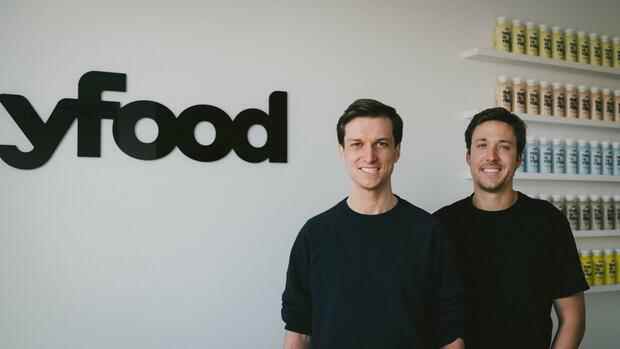Dusseldorf At some point, the two Munich residents Ben Kremer and Noel Bollmann were fed up with greasy fast food. As young bankers at Goldman Sachs and Deutsche Bank, they often didn’t have time to eat healthily. In 2017, they founded YFood to develop a “whole meal from a bottle”. “For everyone who wants to eat a balanced diet in their stressful everyday life,” explains Bollmann.
According to YFood, what looks like a yoghurt drink contains all the essential micro and macronutrients and should satisfy hunger for three to five hours. Four bottles can cover the daily requirement of an adult. The drinking food based on low-fat milk, vegetable oils and oats can be kept without refrigeration. Flavors range from coffee and salted caramel to fresh berry. YFood is now also available as a bar, vegan and as a powder for self-mixing.
With the drinking meal, the founders seem to have caught the zeitgeist. In 2021, YFood claims to have doubled its sales with a seven-digit annual profit. Today, YFood sells products worth more than eight million euros every month. That would be annual sales of around 100 million euros.
>>> Read about this: YFood self-test – Can the drink really replace a meal?
Top jobs of the day
Find the best jobs now and
be notified by email.
“Our customers are a cross-section of the population,” Bollmann sees as a reason for success. YFood is bought by busy consultants and students as well as by gamers, shift workers and long-distance drivers. “Without Corona, we would probably have grown even more. Because people are usually on the road a lot more and have little time for breakfast or lunch.”
Competition to Doner and Big Mac
Kremer makes it clear: “We do not recommend anyone to only eat YFood.” As a rare alternative to junk food, some such products certainly do not harm, says Astrid Donalies from the German Society for Nutrition. The ecotrophologist warns against consuming such drinks to calm one’s conscience. It is sometimes suggested that the meal replacement can compensate for or prevent alleged nutritional errors. The enjoyment aspect, important for a balanced diet, is certainly not served with a drink, bar or powder.
In any case, “Lion’s Cave” investor Frank Thelen was convinced of the business idea and secured 20 percent of YFood in 2018 for 200,000 euros. The founders, who continue to hold the majority, have so far collected 20 million euros – including from the food tech fund Five Seasons, Felix Capital and the milk company Fonterra from New Zealand.
>> Read here: How Oatsome wants to shake up the breakfast market
The founders see an IPO as a “realistic option at some point”. Domenico Cipolla, who made the online furniture retailer Home24 ready for the stock market as CEO until 2016, now works at YFood.
But first the Munich-based company wants to start in the USA. “As always, we first go online to a store. The financial risk is relatively low,” explains Bollmann. “In this way, we can quickly see which products and which marketing work on social media. In a short time we can collect meaningful data and adapt our business model flexibly.” With a customer base on the Internet, it is then all the easier to be listed in retail as well.
The competition in the USA is fierce: YFood is not the only manufacturer of “smart food”. Soylent from the USA sells soy protein-based drinkable meals, but not yet in the EU. Huel from the UK and Saturo from Austria produce something similar.
In addition to drinking meals, the people of Munich also offer bars and hearty hot bowls. The products should be a balanced alternative to fast food such as doner kebabs and hamburgers.
(Photo: YFood)
Like many new brands, YFood initially only sold its products online. The drinking meals are now available online in 30 countries and in retail outlets in six European countries – at a total of 26,000 points of sale. “A good story, contemporary presentation combined with marketing and sales power – that should work,” judges industry expert Barbara Siegert, partner at the Munich Strategy consultancy.
With the exception of dm and Penny, YFood is available from all major retailers in Germany. “Only at discounters like Aldi and Lidl do we deliberately not sell YFood as a premium product,” says Kremer.
Because YFood has its price. A six-pack of 500 milliliter bottles costs 3.59 euros online, and the vegan version costs 3.79 euros. “Our competition is not the cola on the next door, but the kebab or Big Mac,” Kremer clarifies. Compared to that, YFood is “attractively priced”.
“In principle, meal replacers in liquid or solid form are nothing new and not too complex to produce. They consist of common ingredients such as whey or pea protein,” explains Siegert. “Such products are highly processed foods. High-tech, industrial processes are behind this in order to produce long-lasting products with a defined nutrient content from the ingredients,” nutrition expert Donalies points out.
Personalized meals as a goal
At YFood, around 20 of the 150 employees work in product development. At the customer’s request, they are now also creating savory versions. Doused with boiling water, the hot bowls called Italian Pasta or Thai Curry have the consistency of pasta or rice dishes. Like all YFood products, they are made by contract manufacturers.
YFood is also researching personalized meals. Siegert expects that today’s nutrition-conscious self-optimizers will continue to refine their diet. “The personal fitness tracker then communicates with the mixing station for the wellness drink.” The founders of YFood have similar plans: “In the future, it is conceivable that DNA and blood analysis can be used to produce optimal nutrition for current needs at home.”
More: How Eat Happy is rolling out its sushi islands in Europe
